Camping in the mountains might sound like a dream, but it can quickly become a nightmare if you’re not prepared!
From sluggish engines and finicky propane to fast-changing weather and steep, narrow roads, here are 10 frustrating things that can throw off your trip. Plus, how to deal with each one.
1. Your RV Engine Might Struggle
Gas engines lose power as you climb. You can expect to lose about 3% of engine performance for every 1,000 feet of elevation gain. At 8,000 feet, that’s nearly a quarter of your horsepower gone. Your rig will feel sluggish going uphill, and downshifting will become a regular part of the trip.
Tip: Start climbs in a lower gear and stay there. Avoid pushing the engine too hard, and allow more time to reach your site.
2. Propane Appliances May Not Work Right
Appliances that rely on propane, like your fridge, furnace, and water heater, can act up at high elevations. The thinner air can mess with how well propane burns. Some appliances shut off automatically if they sense bad combustion. Others might run but not heat properly. Many units need a high-altitude adjustment above 5,000 to 7,000 feet.
Tip: Check your owner’s manuals before your trip. Some appliances need jets or settings changed to work properly above a certain elevation.
3. Food and Water Cook Differently
Water boils at a lower temperature the higher you go. For example, at 7,500 feet, it boils at around 198°F. That means things like pasta and rice take longer to cook. Sealed food containers can also swell or even pop due to pressure changes.
Tip: Use a lid and give yourself extra time when cooking anything that relies on boiling water.
4. Tire Pressure Can Fluctuate
Tire pressure can rise as altitude increases because the air outside the tire gets thinner. If your tires were already at the upper limit before the climb, the pressure can go too high. Check before you head up and again once you’re parked.
Tip: Measure your tire pressure before and after elevation changes. Adjust as needed to stay within your recommended PSI range.
5. You May Feel Short of Breath
The higher you go, the less oxygen there is in the air. Some people feel lightheaded, tired, or get headaches. Altitude sickness is more common above 7,000 feet. It can hit anyone, even if you’re fit. Pets can feel it too. Drinking water, eating carbs, and taking it easy for the first day can help.
Tip: Go slow on your first day. Stay hydrated, rest often, and avoid alcohol until you’re used to the altitude.
6. Your Generator Might Not Run Well
Generators lose power with altitude, too, about 3.5% per 1,000 feet. If you rely on one for off-grid camping, you may notice it struggling to keep up. Some models need a high-altitude kit to keep running smoothly.
Tip: If your generator has a high-altitude kit or adjustment screw, make the change before heading up. Without it, expect lower output and shorter run time.
7. Batteries Drain Faster in Cold Air
Many high-altitude areas are colder, especially at night. Cold temperatures can lower your battery’s efficiency and reduce how much power it can hold. If you’re using solar, cloudy mountain weather might cut down on charging, too.
Tip: Charge your batteries fully before you arrive. Keep them warm if possible and monitor usage closely overnight.
8. Mountain Weather Changes Fast
At higher elevations, weather patterns shift quickly. One minute it’s sunny, the next it’s hailing. Wind gusts can pick up with no warning. Always check the forecast, but also plan for temps to swing a lot, especially at night.
Tip: Bring warm layers, rain gear, and anchor outdoor items. A small weather radio or app with alerts can help.
9. Stay Hydrated and Monitor Fresh Water Levels
Dry mountain air pulls more moisture out of your body. You’ll lose water just by breathing. You might not feel thirsty, but you still need more fluids. Keep your freshwater tank full if you’re camping without hookups and drink water regularly, even if you’re just sitting around.
Tip: Start hydrating the day before your trip. If you’ll be boondocking, fill up your tank and bring extra water containers.
10. Navigating Mountainous Terrain Safely
Mountain roads often mean steep grades, sharp turns, and narrow passes. You’ll need to slow down, downshift on descents, and avoid riding your brakes. Double-check your brakes before heading into high terrain. Pay attention to weight limits and road warnings, especially if you’re towing.
Tip: Use engine braking instead of your brakes on long downhill grades. Stick to daylight travel and map your route ahead of time.

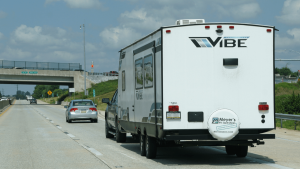
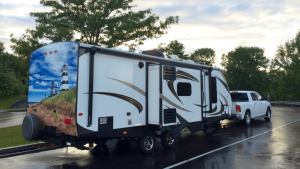
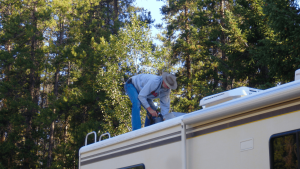
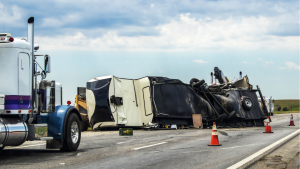
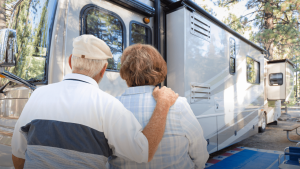
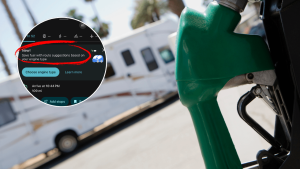
Very interesting. Thank you.